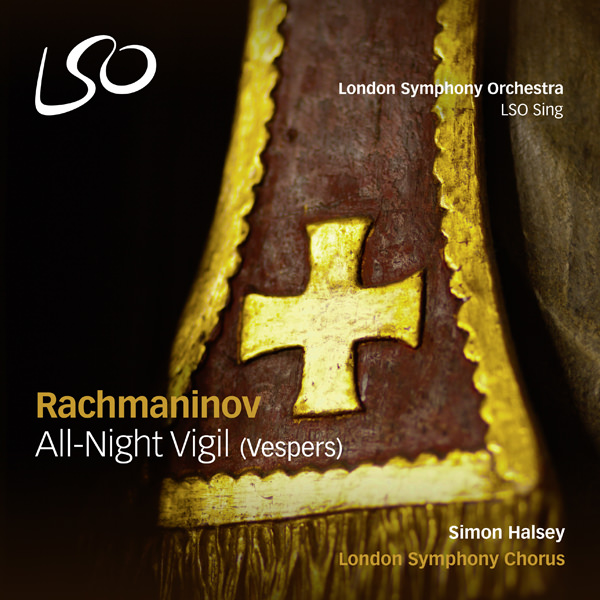
Sergei Rachmaninov – All-Night Vigil (Vespers) – London Symphony Chorus, Simon Halsey (2015)
DSF Stereo DSD64/2.82MHz | Time – 53:21 minutes | 2,12 GB | Genre: Classical
Official Digital Download – Source: nativeDSDmusic | Digital Booklet | © LSO
Recorded live in DSD 128fs, 26 November 2014, and in session, 2 December 2014 at the Barbican, London
Rachmaninov was no conventional believer, but the rituals and traditions of the Orthodox Church were an essential part of his musical and cultural background. Phrases reminiscent of liturgical chant appear in his music throughout his life, from the First Symphony of 1895 to the Symphonic Dances of 1940; the last of these, indeed, includes an important quotation from the ninth movement of the Vigil. Rachmaninov’s setting of the All-Night Vigil was composed in January and February 1915.
The outbreak of World War I in August 1914 took many people by surprise, and to Rachmaninov it was a severe shock. Since 1906 he had spent a great deal of time in Dresden, where he went for some months nearly every year to compose undisturbed by the pressures of musical life in Moscow, and had a deep love of German culture. Now he found himself confined to Russia and surrounded by an atmosphere of belligerence and xenophobia. His genuine patriotism was horrified by the gutter nationalism that swept the country. In these circumstances he may well have asked himself what it was that was most true and valuable in Russian culture, and turned again to the music of the church choirs that had so impressed him in his childhood.
The Russian Orthodox Church has always recognised the importance of music in its services, but has at the same time imposed restrictions on its performance, which have prevented anything like the musical development that occurred in the Western Church. The guiding principle in Orthodox church music is that the projection of the sacred texts should at all times be clear, and that nothing should in any way obscure their audibility or their meaning. The words were to be set clearly and continuously, which severely limited the use of such devices as canon and polyphonic imitation. Music was to consist only of singing: no instruments were ever admitted.
Although often referred to as Rachmaninov’s ‘Vespers’, these 15 movements for unaccompanied chorus make up an All-Night Vigil service, which consists not only of Vespers (Nos 1-6), but also includes the liturgical offices of Matins (7-11), Lauds (12) and Prime (13-15). As the Russian Orthodox Church considers the day to begin and end at sunset, the celebration of Sundays and major feast days would begin on the preceding evening with the office of Vespers, and continue through the night until the morning, when the main office of the day would be celebrated.
Although Rachmaninov took great care to observe the general principles of Orthodox church music, he seems to have realised that the practical difficulties of his Vigil made liturgical performances unlikely. The choral writing makes huge demands on even the most skilled choirs. The choir is divided into the normal four ranges of soprano, alto, tenor and bass, but straightforward four-part writing is rare. Each voice is frequently subdivided into two, and sometimes three parts, and in the course of the 15 movements Rachmaninov shows astonishing resource in exploiting every possibility offered by changes of texture, timbre, register and weight. The ranges of the voices reflect particular Russian traditions: the sopranos go no higher than A natural, but the basses are frequently taken down to low D, and there are a number of low Cs and on three occasions low B flats.
The principal melodic lines are closely moulded to the sound and meaning of the text, and tend to move by steps or in small intervals rarely larger than a third. Several movements are actually based on existing chants (Nos 2, 4, 5, 9, 13, 14 and 15); others are melodically original, though Rachmaninov immersed himself so completely in the traditional chants that it is impossible to tell the difference. What is outstanding is the variety of choral, rhythmic and harmonic treatment, all aimed at the expression of the texts, from exuberant praise and thanksgiving to more inward moments of awe, penitence and meditation. -Andrew Huth © 2016
Tracklist:
Sergei Rachmaninov (1873-1943)
All-Night Vigil (‘Vespers’) Op 37 (1915)
1 i. Come, let us worship [Priidite, poklonimsia] 1’53’’
2 ii. Bless the Lord, O my soul [Blagoslovi, dushe moya] * 4’12’’
3 iii. Blessed is the man [Blazhen muzh] 4’30’’
4 iv. Gladsome Light [Svete tihiy] ** 2’34’’
5 v. Lord, now lettest Thou Thy servant (Nunc Dimittis) [Nïne otpushchayeshï] ** 3’03’’
6 vi. Rejoice, O virgin (Ave Maria) [Bogoroditse Devo, raduysia] 2’33’’
7 vii. The Six Psalms (Introduction) – Glory be to God (The Lesser Doxology) [Shestopsalmiye] † 2’17’’
8 viii. Praise the Name of the Lord [Hvalite imia Ghospodne] † 2’14’’
9 ix. Blessed art Thou, O Lord [Blagosloven yesi, Ghospodi] † 6’08’’
10 x. Having beheld the resurrection of Christ [Voskreseniye Hristovo videvshe] 3’12’’
11 xi. My soul doth magnify the Lord (Magnificat) [Velichit dusha moya Ghospoda] 7’19’’
12 xii. Glory be to God on high (The Great Doxology) [Slavosloviye velikoye] † 7’13’’
13 xiii. Troparion. Today hath salvation come [Tropar “Dnes’ spaseniye”] † 1’41’’
14 xiv. Troparion. Thou didst rise from the tomb [Tropar “Voskres iz groba”] † 2’59’’
15 xv. To Thee, the victorious leader [Vzbrannoy voyevode] * 1’40’’
* “Greek” Chant [Grecheskovo rospeva]
** Kiev Chant [Kiyevskovo rospeva]
† Znamenny Chant [Znamennovo rospeva]
Personnel:
London Symphony Chorus
Simon Halsey, conductor
Christine Jasper, alto
Dan Owers, tenor
Download:
mqs.link_RachmaninvAllNightVigilVespersLndnSymphnyChrusSimnHalsey2015nativeDSDmusicDSD64.part1.rar
mqs.link_RachmaninvAllNightVigilVespersLndnSymphnyChrusSimnHalsey2015nativeDSDmusicDSD64.part2.rar
mqs.link_RachmaninvAllNightVigilVespersLndnSymphnyChrusSimnHalsey2015nativeDSDmusicDSD64.part3.rar




















![Carl Nielsen - Symphonies Nos. 1-6 - London Symphony Orchestra, Sir Colin Davis (2015) [Blu-Ray Pure Audio Disc + DSF Stereo DSD64/2.82MHz] Carl Nielsen - Symphonies Nos. 1-6 - London Symphony Orchestra, Sir Colin Davis (2015) [Blu-Ray Pure Audio Disc + DSF Stereo DSD64/2.82MHz]](https://getimg.link/images/imgimgimg/uploads/2015/09/Wnf48VE.jpg)
![Sergei Rachmaninoff: All-Night Vigil - Paul Hillier, Estonian Philharmonic Chamber Choir (2005) [HDTracks FLAC 24bit/88,2kHz] Sergei Rachmaninoff: All-Night Vigil - Paul Hillier, Estonian Philharmonic Chamber Choir (2005) [HDTracks FLAC 24bit/88,2kHz]](https://getimg.link/images/imgimgimg/uploads/2017/02/sZMvrpE.jpg)
![London Symphony Orchestra, Valery Gergiev - Rachmaninov: Symphonic Dances; Stravinsky: Symphony in Three Movements (2012) [nativeDSDmusic DSF DSD64/2.82MHz] London Symphony Orchestra, Valery Gergiev - Rachmaninov: Symphonic Dances; Stravinsky: Symphony in Three Movements (2012) [nativeDSDmusic DSF DSD64/2.82MHz]](https://getimg.link/images/imgimgimg/uploads/2019/05/uY4KEqQ.jpg)
![Maria Callas - Remastered The Complete Studio Recordings 1949-1969 (2014) [Qobuz FLAC 24bit/96kHz] Maria Callas - Remastered The Complete Studio Recordings 1949-1969 (2014) [Qobuz FLAC 24bit/96kHz]](https://getimg.link/images/imgimgimg/uploads/2018/12/Vw7IHlv-1.jpg)
![London Symphony Orchestra, Valery Gergiev - Rachmaninov: Symphony No. 1; Balakirev: Tamara (2016) [nativeDSDmusic DSF DSD64/2.82MHz + FLAC 24bit/96kHz] London Symphony Orchestra, Valery Gergiev - Rachmaninov: Symphony No. 1; Balakirev: Tamara (2016) [nativeDSDmusic DSF DSD64/2.82MHz + FLAC 24bit/96kHz]](https://getimg.link/images/imgimgimg/uploads/2019/05/YildmwU.jpg)
![London Symphony Orchestra, Valery Gergiev - Rachmaninov: Symphony No. 3; Balakirev: Russia (2015) [nativeDSDmusic DSF DSD64/2.82MHz] London Symphony Orchestra, Valery Gergiev - Rachmaninov: Symphony No. 3; Balakirev: Russia (2015) [nativeDSDmusic DSF DSD64/2.82MHz]](https://getimg.link/images/imgimgimg/uploads/2019/05/BSou4Lj.jpg)
![John Eliot Gardiner - Bach: St Matthew Passion BWV 244 (2017) [FLAC 24bit/96kHz] John Eliot Gardiner - Bach: St Matthew Passion BWV 244 (2017) [FLAC 24bit/96kHz]](https://getimg.link/images/imgimgimg/uploads/2017/12/h2b27Jr.jpg)
![Sir Colin Davis, London Symphony Orchestra - Haydn: Symphonies Nos. 92 & 93, 97-99 (2014) [Qobuz FLAC 24bit/96kHz] Sir Colin Davis, London Symphony Orchestra - Haydn: Symphonies Nos. 92 & 93, 97-99 (2014) [Qobuz FLAC 24bit/96kHz]](https://getimg.link/images/imgimgimg/uploads/2017/08/O1wILBY.jpg)
![Steve Reich - Sextet, Music for Pieces of Wood, Clapping Music - LSO Percussion Ensemble (2016) [B&W FLAC 24bit/96kHz] Steve Reich - Sextet, Music for Pieces of Wood, Clapping Music - LSO Percussion Ensemble (2016) [B&W FLAC 24bit/96kHz]](https://getimg.link/images/imgimgimg/uploads/2017/04/32X8kN6.jpg)
![Sergei Rachmaninov - Vespers, Op.37 - St Petersburg Chamber Choir, Nikolai Korniev (2003) [Qobuz FLAC 24bit/96kHz] Sergei Rachmaninov - Vespers, Op.37 - St Petersburg Chamber Choir, Nikolai Korniev (2003) [Qobuz FLAC 24bit/96kHz]](https://getimg.link/images/imgimgimg/uploads/2017/08/7wBsIzj.jpg)
![Roman Simovic, LSO String Ensemble - Vaughan Williams: Fantasia on a Theme by Thomas Tallis (2016) [Qobuz FLAC 24bit/96kHz] Roman Simovic, LSO String Ensemble - Vaughan Williams: Fantasia on a Theme by Thomas Tallis (2016) [Qobuz FLAC 24bit/96kHz]](https://getimg.link/images/imgimgimg/uploads/2019/01/ZMC6s0a.jpg)
![Michael Tilson Thomas, The San Francisco Symphony - The Mahler Project (2010) [FLAC 24bit/96kHz] Michael Tilson Thomas, The San Francisco Symphony - The Mahler Project (2010) [FLAC 24bit/96kHz]](https://getimg.link/images/imgimgimg/uploads/2017/01/HHDTsz0.jpg)
![Robert Schumann - Das Paradies und die Peri - London Symphony Chorus & Orchestra, Sir Simon Rattle (2015) [nativeDSDmusic DSF DSD64/2.82MHz] Robert Schumann - Das Paradies und die Peri - London Symphony Chorus & Orchestra, Sir Simon Rattle (2015) [nativeDSDmusic DSF DSD64/2.82MHz]](https://getimg.link/images/imgimgimg/uploads/2017/06/Wr9S2Bm.jpg)
![London Symphony Orchestra & Sir Simon Rattle and others - Bernstein: Wonderful Town (Bonus Track Version) (2018) [FLAC 24bit/96kHz] London Symphony Orchestra & Sir Simon Rattle and others - Bernstein: Wonderful Town (Bonus Track Version) (2018) [FLAC 24bit/96kHz]](https://getimg.link/images/imgimgimg/uploads/2019/02/1TyLZXw.jpg)
![Vanessa Benelli Mosell - Rachmaninov: Piano Concerto No. 2 - Corelli Variations (2017) [Qobuz FLAC 24bit/96kHz] Vanessa Benelli Mosell - Rachmaninov: Piano Concerto No. 2 - Corelli Variations (2017) [Qobuz FLAC 24bit/96kHz]](https://getimg.link/images/imgimgimg/uploads/2017/12/drcrArG.jpg)